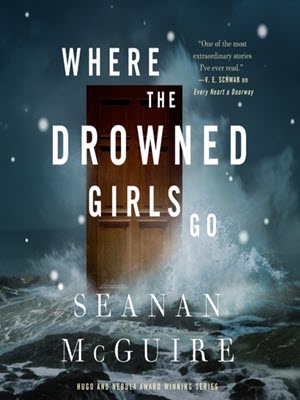Where the Drowned Girls Go
 Keeping a series going is a skill. Not all writers have it. Juliet McKenna has certainly got the knack as she keeps churning out Green Man books for me. Seanan McGuire, however, is a queen of series writing. Where the Drowned Girls Go is the seventh novella in the Wayward Children series, but that’s nothing; the October Daye series is already up to 15 full novels. I don’t know how she does it.
Keeping a series going is a skill. Not all writers have it. Juliet McKenna has certainly got the knack as she keeps churning out Green Man books for me. Seanan McGuire, however, is a queen of series writing. Where the Drowned Girls Go is the seventh novella in the Wayward Children series, but that’s nothing; the October Daye series is already up to 15 full novels. I don’t know how she does it.
The other thing about a series is that you have choices to make about how stand-alone each book is, and how much character development you put it. Personally (and with a great deal of publisher bias) I think that McKenna has got that about right. Where the Drowned Girls Go is much more tied in to previous books in the series.
The book’s main protagonist is Cora, the mermaid girl, but it also features Sumi from Beneath the Sugar Sky, and Regan from Across the Green Grass Fields. What’s more there is a developing plot. If Eleanor West’s Home for Wayward Children is in some ways modelled on Professor Xavier’s School for Gifted Youngsters (and McGuire is a massive X-Men fan), then there must be a Magneto to oppose it. That comes in the form of the Whitethorn Institute, a strict and brutal place that promises to teach wayward children to forget their lives in magical realms and become ordinary, boring members of the mundane world.
Cora, thanks to her adventures on The Moors in Come Tumbling Down, has been haunted by beings called The Drowned Gods. Although The Moors are not the world in which Cora became a mermaid, they are very watery. The Drowned Gods, who are blessed with far too many teeth and tentacles, have seen a fellow water-spirit in Cora and are determined to have her. Being unable to shake them off, Cora takes a desperate step and asks Miss West for a transfer to Whitethorn. Maybe there she can learn to forget.
The point of this is to allow McGuire to explore Whitethorn from the inside, but rather more importantly it explores the sort of place that children might get sent if they are deemed too different by their parents. I was struck by this passage:
“… because we’re still legally children, our parents get to decide what’s true for us. They get to say they want their ‘real’ kids back, the ones they wanted, and not the ones they ended up with.”
This reminds me very much of the sort of thing that is said about trans kids. Parents who believe in made-up psychiatric conditions such as “Rapid Onset Gender Dysphoria” believe that their ‘real’ kids have somehow been brainwashed into being trans, and that this can be reversed if sufficient cruelty is applied to the problem.
Of course the same is true of many other aspects of childhood. Parents have expectations for their children, and those expectations are not always fulfilled. The above quote could easily be about a kid who has decided she wants to study astronomy, or to play tennis, when her parents have their hearts set on her becoming a lawyer. Whitethorn is a place that stamps out individuality and enforces social norms. Magneto was fighting for mutant rights, just as Xavier was, but in a very different way. Whitethorn is far more evil. An X-Men equivalent to Whitethorn would try to cure the pupils of being mutants.
All this is well and good, but this is also Hugo reading. I enjoyed the book, as I enjoy all of the Wayward Children series. However, the Novella category is fiercely competitive these days so my vote might go elsewhere. Truly, we are living in a golden age of novellas.

Title: Where the Drowned Girls Go
By: Seanan McGuire
Publisher: St. Martin's Press
Purchase links:
Amazon UK
Amazon US
See here for information about buying books though Salon Futura